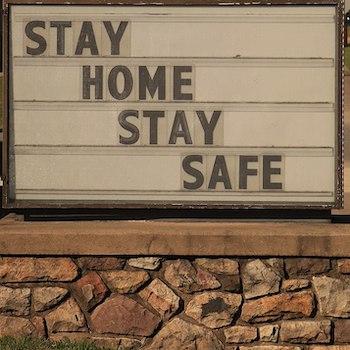What's the best way for young people to avoid having babies and acquiring undesirable microbial species in their nether regions? Abstinence. It works every single time. Young people should wait until they're married.
The trouble with abstinence is that very few actually practice it. According to the CDC, nearly 90% of ever-married men and women engaged in premarital sex. A religious upbringing and self-discipline are often impotent (no pun intended) when faced with raging hormones. No wonder St. Augustine admitted in his book Confessions that he prayed, "Grant me chastity and continency, but not yet."
It's for these reasons that abstinence-only sex education as official public health policy is shunned -- not because the goal is unadmirable but because it is unrealistic. Yet, public health officials all over the world just endorsed and implemented an indefinite lockdown to control the coronavirus, a policy every bit as unrealistic as abstinence-only sex ed.
Why is it unrealistic? Because like abstinence-only sex education, it ignores basic biological reality: Humans are social creatures, and we must socialize. We also don't like being forced to stay in one location with few liberties, which is why we find prison so awful. Without sociability and mobility, our mental health deteriorates.
Yet, on CNN, biology professor Erin Bromage blamed young people (defined as those under 50 years of age) for spreading the virus. He said they were akin to embers that help maintain and spread wildfires. Today, CDC Director Robert Redfield asked young Americans to be responsible and wear masks.
They're both right. But young people aren't that responsible. It's part of being young. Was it ever realistic to assume that teenagers, college students, and other young people were going to stay at home and do nothing for spring break or during the summer? Of course not. For better or worse, Americans in particular have a unique penchant for rejecting authority, which is why lockdown efforts failed spectacularly in the United States. We can't even get adults to wear masks.
Now, that doesn't mean that lockdowns don't work anywhere. Just like abstinence-only sex education, some people really do follow the advice. Strict lockdowns largely worked throughout Europe and Asia, for instance. For better or worse, Europeans and Asians tend to be more compliant and community-minded than Americans, which is one reason why they may be more willing to submit to restrictions. (However, my guess is that they would not follow them indefinitely.)
The point is that successful policies must take biological reality and culture into account. What works in one country (or even most other countries) may not work in another one. Spain isn't about to ban the running of the bulls even though it's incredibly stupid and people have died.
Likewise, telling Americans to stay home was bound to fail. A smarter policy could be to encourage (or perhaps mandate) masks in indoor public places, require restaurants and similar establishments to disinfect tables, require the installation of hand sanitizing stations in all public places, and implement special restrictions for hospitals and nursing homes. Areas that experience a resurgence in COVID-19 cases may need to temporarily implement more restrictive social distancing policies to prevent healthcare resources from being overwhelmed.
But governments must be extremely careful when implementing these kinds of policies. Already, we're seeing signs of "caution fatigue," in which people conclude that they'd rather get the virus than continue living under what feels like house arrest.
Hopefully, policymakers have learned that a targeted approach that maximizes personal liberty as much as possible is the only way to tame the virus in the United States.




